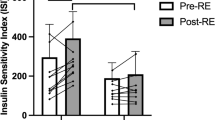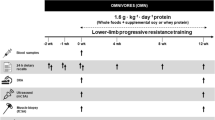Abstract
L-carnitine is popular as a potential ergogenic aid because of its role in the conversion of fat into energy. The present study was undertaken to investigate the effect of short term supplementation of L-carnitine on metabolic markers and physical efficiency tests under short term calorie restriction. Male albino rats were divided into four groups (n = 12 in each)—control, calorie restricted (CR for 5 days, 25 % of basal food intake), L-carnitine supplemented (CAR, given orally for 5 days at a dose of 100 mg/kg), CR with L-carnitine supplementation (CR + CAR). Food intake and body weight of the rats were measured along with biochemical variables like blood glucose, tissue glycogen, plasma and muscle protein and enzymatic activities of CPT-1 (carnitine palmitoyl transferase-1) and AMP kinase. Results demonstrated that L-carnitine caused marked increase in muscle glycogen, plasma protein, CPT-1 activity and swim time of rats (P < 0.05) on short term supplementation. In addition to the substantive effects caused by CR alone, L-carnitine under CR significantly affected muscle glycogen, plasma protein, CPT-1 activity and AMP kinase (P < 0.05). Short term CR along with L-carnitine also resulted in increased swim time of rats than control, CR and L-carnitine treated rats (P < 0.05). The present study was an attempt towards developing an approach for better adherence to dietary restriction regimen, with the use of L-carnitine.

Similar content being viewed by others
References
Stephens FB, Constantin-Teodosiu D, Greenhaff PL. New insights concerning the role of carnitine in the regulation of fuel metabolism in skeletal muscle. J Physiol. 2007;581(2):431–44.
Malaguarnera M. Carnitine derivatives: clinical usefulness. Curr Opin Gastroenterol. 2012;28(2):166–76.
Hongu N, Sachan DS. Carnitine and choline supplementation with exercise alter carnitine profiles, biochemical markers of fat metabolism and serum leptin concentration in healthy women. J Nutr. 2003;133(1):84–9.
Redman LM, Ravussin E. Caloric restriction in humans: impact on physiological, psychological and behavioural outcomes. Antioxid Redox Signal. 2011;14(2):275–87.
Wang Z, Masternak MM, Al-Regaiey KA, Bartke A. Adipocytokines and the regulation of lipid metabolism in growth hormone transgenic and calorie restricted mice. Endocrinology. 2007;148(6):2845–53.
Bonkowski MS, Rocha JS, Masternak MM, Al Regaiey KA, Bartke A. Targeted disruption of growth hormone receptor interferes with the beneficial actions of calorie restriction. Proc Natl Acad Sci. USA. 2006;103:7901–5.
Civitarese AE, Carling S, Heilbronn LK, Hulver MH, Ukropcova B, Deutsch WA, Smith SR, Ravussin E, CALERIE Pennington Team. Calorie restriction increases muscle mitochondrial biogenesis in healthy humans. PLoS Med. 2007;4(3):e76.
Lefevre M, Redman LM, Heilbronn LK, Smith JV, Martin CK, Rood JC, Greenway FL, Williamson DA, Smith SR, Ravussin E, Pennington CALERIE team. Caloric restriction alone and with exercise improves CVD risk in healthy non-obese individuals. Atherosclerosis. 2009;203(1):206–13.
Willcox BJ, Willcox DC, Todoriki H, Fujiyoshi A, Yano K, He Q, Curb JD, Suzuki M. Caloric restriction, the traditional Okinawan diet, and healthy aging: the diet of the world’s longest-lived people and its potential impact on morbidity and life span. Ann N Y Acad Sci. 2007;1114(1):434–55.
Jung KJ, Lee EK, Kim JY, Zou Y, Sung B, Heo HS, Kim MK, Lee J, Kim ND, Yu BP, Chung HY. Effect of short term calorie restriction on pro-inflammatory NF-Kb and AP-1 in aged rat kidney. Inflamm Res. 2009;58(3):143–50.
Committee on Military Nutrition Research, Institute of Medicine, Not eating enough. Institute of Medicine: The National Academy Press; 1995.
Holloszy JO. Mortality rate and longevity of food restricted exercising male rats: a reevaluation. J Appl Physiol. 1997;82(2):03–399.
Kim JH, Kwak HB, Leeuwenburgh C, Lawler JM. Lifelong exercise and mild (8%) calorie restriction attenuate age-induced alterations in plantaris muscle morphology, oxidative stress and IGF-1 in the Fischer-344 rat. Exp Gerantol. 2008;43:317–29.
Huffman DM, Moellering DR, Grizzle WE, Stockyard CR, Johnson MS, Nagy TR. Effect of exercise and calorie restriction on biomarkers of aging in mice. Am J Physiol Regul Integr Comp Physiol. 2008;294(5):R1618–27.
Montgomery R. Determination of glycogen. Arch Biochem Biophys. 1957;67(2):378–86.
Halperin ML, Pande SV. Fatty acyl group transport into mitochondria: carnitine palmitoyltransferase EC 2.3.1.23 and carnitine–acylcarnitine translocase. Methods Enzymol. 1979;56:368–78.
Lowry OH, Rosebrough NJ, Farr AL, Randall RJ. Protein measurement with the folin phenol reagent. J Biol Chem. 1951;193(1):265–75.
Ta LE, Low PA, Windebank AJ. Mice with cisplatin and oxaliplatin-induced painful neuropathy develop distinct early responses to thermal stimuli. Mol Pain. 2009;5(1):9.
Porsolt RD, Bertin A, Jalfre M. Behavioural despair in mice: a primary screening test for antidepressants. Arch Int Pharmacodyn Ther. 1977;229(2):327–36.
Venditti P, Piro MC, Artiaco G, Di Meo S. Effect of exercise on tissue antioxidant capacity and heart electrical properties in male and female rats. Eur J Appl Physiol Occup Physiol. 1996;74(4):322–9.
Duraisami R, Mohite VA, Kasbe AJ. Antistress adaptogenic activity of standardized dried fruit extract of Aegle marmelos against diverse stressors. Asian J Pharm Clin Res. 2010;3(4):1–3.
Brandsch C, Eder K. Effect of L-carnitine on weight loss and body composition of rats fed a hypocaloric diet. Ann Nutr Metab. 2002;46(5):205–10.
Dokken BB and Tsao TS. The physiology of body weight regulation: are we too efficient for our own good? Diabetes Spectr. 2007;20:166–70.
De Gaetano A, Mingrone G, Castagneto M, Calvani M. Carnitine increases glucose disposal in humans. J Am Coll Nutr. 1999;18(4):289–95.
Ringseis R, Keller J, Eder K. Role of carnitine in the regulation of glucose homeostasis and insulin sensitivity: evidence from in vivo and in vitro studies with carnitine supplementation and carnitine deficiency. Eur J Nutr. 2012;51(1):1–18.
White TW, Gentry LR, Gentry GT, Fernandez JM, Chapa AM, Blouin DC. Effect of urea, fish meal and carnitine in liquid supplement on growth and metabolites of grazing calves. J Anim Sci. 1997;75:262.
Hadadinezhad S, Ghazaleh N, Razavi Z. Effects of l-carnitine on glycemic control and C-peptide levels in patients with type 2 diabetes mellitus. Turk Jem. 2008;12:1–3.
Chapa AM, Fernandez JM, White TW, Bunting LD, Gentry LR, Ward TL, Blum SA. Influence of intravenous l-carnitine administration in sheep preceding an oral urea drench. J Anim Sci. 1998;76:2930–7.
Cetin M, Petek M, Polat U, Yalcin A. Effects of dietary carnitine supplementation on plasma carnitine and some serum biochemical parameters in lambs. Rev Méd Vét. 2003;154:195–8.
Mohamad-Shahi M, Karandish M, Haidari F, Omidian K, Fatemi-Tabatabayei SR, Rafiei H. Effect of daidzein-low-calorie diet on body weight, serum levels of glucose, resistin, and high sensitive C-reactive protein in high fat, high calorie diet induced rats. Saudi Med J. 2012;33:70–5.
Molfino A, Cascino A, Conte C, Ramaccini C, Rossi Fanelli F, Laviano A. Caloric restriction and l-carnitine administration improves insulin sensitivity in patients with impaired glucose metabolism. J Parenter Enter Nutr. 2010;34:295–9.
Bloomer RJ, Fisher-Wellman KH, Tucker PS. Effect of oral acetyl l-carnitine arginate on resting and postprandial blood biomarkers in pre-diabetics. Nutr Metab (Lond). 2009;6:25.
Cederblad G, Bylund AC, Holm J, Scherstén T. Carnitine concentration in relation to enzyme activities and substrate utilization in human skeletal muscles. Scand J Clin Lab Invest. 1976;36:547–52.
Nishida N, Sugimoto T, Takeuchi T, Kobayashi Y. Effect of l-carnitine on glycogen synthesis and ATP production in cultured hepatocytes of the newborn rat. J Nutr. 1989;119:1705–8.
Brevetti G, Fanin M, De Amicis V, Carrozzo R, Di Lello F, Martone VD, Angelini C. Changes in skeletal muscle histology and metabolism in patients undergoing exercise deconditioning: effect of propionyl-l-carnitine. Muscle Nerve. 1997;20:1115–20.
Young VR, Marchini JS, Cortiella J. Assessment of protein nutritional status. J Nutr. 1990;120:1496–502.
Fuhrman MP, Charney P, Mueller CM. Hepatic proteins and nutrition assessment. J Am Diet Assoc. 2004;104:1258–64.
Miller BF, Robinson MM, Reuland DJ, Drake JC, Peelor FF III, Bruss MD, Hamilton KL. Calorie restriction does not increase short-term or long-term protein synthesis. J Gerontol A. 2013;68:530–8.
Consolazio CF, Matoush LO, Johnson HL, Krzywicki HJ, Isaac GJ, Witt NF. Metabolic aspects of calorie restriction: hypohydration effects on body weight and blood parameters. Am J Clin Nutr. 1968;21:793–802.
Bruss MD, Khambatta CF, Ruby MA, Aggarwal I, Hellerstein MK. Calorie restriction increases fatty acid synthesis and whole body fat oxidation rates. Am J Physiol Endocrinol Metab. 2010;298:E108–16.
Guo H, Liu G, Zhong R, Wang Y, Wang D, Xia M. Cyanidin-3-O-β-glucoside regulates fatty acid metabolism via an AMP-activated protein kinase-dependent signaling pathway in human HepG2 cells. Lipids Health Dis. 2012;11:10.
Xi L, Brown K, Woodworth J, Shim K, Johnson B, Odle J. Maternal dietary L-carnitine supplementation influences fetal carnitine status and stimulates carnitine palmitoyltransferase and pyruvate dehydrogenase complex activities in swine. J Nutr. 2008;138:2356–62.
Steinberg GR, Kemp BE. AMPK in health and disease. Physiol Rev. 2009;89:1025–78.
McBride A, Ghilagaber S, Nikolaev A, Hardie DG. The glycogen-binding domain on the AMPK beta subunit allows the kinase to act as a glycogen sensor. Cell Metab. 2009;9:23–34.
Owen L, Sunram-Lea SI. Metabolic agents that enhance ATP can improve cognitive functioning: a review of the evidencefor glucose, oxygen, pyruvate, creatine, and l-carnitine. Nutrients. 2011;3:735–55.
Perrin C, Knauf C, Burcelin R. Intracerebroventricular infusion of glucose, insulin, and the adenosine monophosphate-activated kinase activator, 5-aminoimidazole-4-carboxamide-1-beta-d-ribofuranoside, controls muscle glycogen synthesis. Endocrinology. 2004;145:4025–33.
Spiering BA, Kraemer WJ, Vingren JL, Hatfield DL, Fragala MS, Ho JY, Maresh CM, Anderson JM, Volek JS. Responses of criterion variables to different supplemental doses of l-carnitine l-tartrate. J Strength Cond Res. 2007;21:259–64.
Kraemer WD, Volek JS, Spiering BA, Vingren JL. l-carnitine supplementation: a new paradigm for its role in exercise. Monatsh Chem. 2005;136:1383–90.
Spasov AA, Iezhitsa IN, Kravchenko MS, Pisarev VB, Snigur GL. Effects of l-, d-, and dl-carnitine on morphometric parameters of skeletal muscle and exercise performance of laboratory animals receiving carnitine-deficient diet. Bull Exp Biol Med. 2006;142:458–60.
Brass EP. Carnitine and sports medicine: use or abuse? Ann N Y Acad Sci. 2004;1033:67–78.
Pekala J, Patkowska-Sokoła B, Bodkowski R, Jamroz D, Nowakowski P, Lochynski S, Librowski T. l-carnitine—metabolic functions and meaning in humans life. Curr Drug Metab. 2011;12:667–78.
Gramignano G, Lusso MR, Madeddu C, Massa E, Serpe R, Deiana L, Lamonica G, Dessì M, Spiga C, Astara G, Macciò A, Mantovani G. Efficacy of l-carnitine administration on fatigue, nutritional status, oxidative stress, and related quality of life in 12 advanced cancer patients undergoing anticancer therapy. Nutr J. 2006;22:136–45.
Fuster G, Busquets S, Almendro V, López-Soriano FJ, Argilés JM. Antiproteolytic effects of plasma from hibernating bears: a new approach for muscle wasting therapy? Clin Nutr. 2007;26:658–61.
Peng S. Plank LD, McCall JL, Gillanders LK, Mcllroy K, Gane EJ. Body composition, muscle function, and energy expenditure in patients with liver cirrhosis: a comprehensive study. Am J Clin Nutr. 2007;85:1257–66.
Acknowledgment
Authors are thankful to DIPAS, Defence Research and Development Organisation (DRDO) for the financial support of the study.
Author information
Authors and Affiliations
Corresponding author
Rights and permissions
About this article
Cite this article
Jain, S., Singh, S.N. Effect of L-carnitine Supplementation on Nutritional Status and Physical Performance Under Calorie Restriction. Ind J Clin Biochem 30, 187–193 (2015). https://doi.org/10.1007/s12291-014-0437-1
Received:
Accepted:
Published:
Issue Date:
DOI: https://doi.org/10.1007/s12291-014-0437-1




